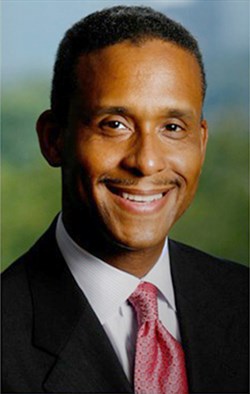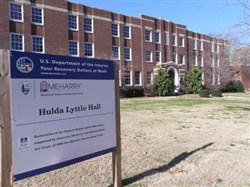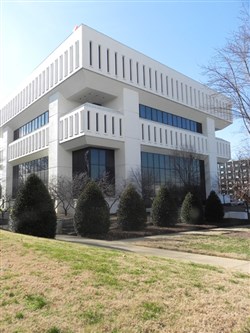VOL. 36 | NO. 1 | Friday, January 6, 2012
Meharry’s endowment growth, construction projects defy down economy
By Linda Bryant

Dr. Wayne J. Riley, Meharry’s president and CEO
Meharry Medical College has long been known as a small but powerful institution, keenly focused on training minority health care professionals. But in recent years, the school has been quietly and systematically broadening its reach – locally, nationally and on campus among student and faculty.
The storied 135-year-old medical school has attracted more than $55 million in investment since 2009, is adding new lines of study and is laying the groundwork to increase enrollment by 40 percent over the next decade. Meharry’s North Nashville campus is also in the middle of a $25 million building and renovation boom.
It also has shown an ability to grow its endowment during hard times. Dr. Wayne J. Riley, Meharry’s president and CEO, says the school’s $105 million endowment is the second largest among Middle Tennessee’s numerous universities and colleges. Only Vanderbilt University, with its Goliath endowment of $3.3 billion, is larger.
“We’ve been operating in a terribly tough fundraising environment, but we’re managing to run countercyclical to the national trend of dwindling endowments,” Riley says.
When he came to Meharry in 2007 to serve as its 10th president, Riley was determined to bring more attention to the school.
“I wanted to make sure Meharry would continue to be engaged nationally and locally,” Riley says. “I wanted to think broadly and have an expansive vision.”
Riley may well be one of the reasons for the increased attention. He serves on a cluster of prominent national boards and committees. One of the most influential is his chairmanship of the National Advisory Council on Minority Health and Health Disparities of the National Institutes of Health. Last year he was elected to the prestigious Society of Medical Administrators.
So it’s not unusual for Riley to take a call from the White House, the U.S. Department of Human Services or the National Institutes of Health.
Building boom
Meharry’s growth spurt has translated into multimillion-dollar renovations and improvements to the historic buildings at the school, as well as the construction of a major new one – the $1.6 million Alumni Hall. Work began in late November on the 5,600-square-foot facility, which will be used for seminars, receptions and community gatherings for up to 350 people.

Hulda Lyttle Hall, which is on the National Register of Historic Places, is undergoing a $1 million renovation. Current contruction projects across the campus total $25 million.
-- Photo: Lyle Graves | Nashville LedgerRiley calls the project a “significant milestone” because it fills a need within the student/faculty population for an inspiring environment suitable for social gatherings and events.
“It will be a resource for all of Nashville,” he says, adding he hopes outside groups will make us of the space.
Also under construction:
l A state-of-the-art dental simulation center, made possible by a $770,000 grant from Delta Dental
l A multi-phased, top-to-bottom, $1 million renovation of Hulda Lyttle Hall, a 32,000-square foot building on the National Register of Historic Places. The former dormitory for Meharry’s now-defunct nursing school has been vacant since 1992 because of severe deterioration. Funding for the renovation was provided by National Parks Service, a stimulus-enhanced grant from the American Recovery and Reinvestment Act and private donors.
l A $4.7 million renovation of its S.S. Kresge Learning Resource Center. The LEED certified project includes a student café, a new digital library, new ventilation, lighting and electrical systems and a medical simulation center with a replica of an emergency and patient exam room.
Second-year dental student Erica King says the campus upgrade contributes to student morale and adds an even-stronger sense of community.
“Being on Meharry’s campus is like being at an ongoing family reunion,” King says. “It’s a close-knit community. Everyone knows each other and is extremely helpful. Starting out as a dental student, I had medical and graduate students outside of my dental school friends offering to help me. People are genuinely interested in my successful preparation and matriculation.”
King’s great grandfather and grandfather were graduates of Meharry’s School of Dentistry, and her father is a 1981 graduate of the School of Medicine. She says the legendary status of the school among African Americans threads though families and communities across generations.

The Meharry Medical College Information Center Library is housed in the S.S. Kresge Learning Resource Center. The facility is undergoing a $4.7 million renovation. The LEED certified project includes a student café, a new digital library, new ventilation, lighting and electrical systems and a medical simulation center with a replica of an emergency and patient exam room.
-- Photo: Lyle Graves | Nashville Ledger“I have heard stores about Meharry my whole life,” King says. “Meharry provides a professional education along with a culturally stimulating experience and environment, faculty that become like extended family members and classmates that relate to me enough that they will become lifelong friends and potentially business partners.”
On the front lines of health policy
Meharry also is making history with the Robert Wood Johnson Foundation Center for Health Policy. The program, barely 2 years old, has been called the most ambitious of its kind in the United States. Its aim is to increase the number and diversity of Ph.D.-level scholars with formal training in political science, sociology and economics, and who also work in health services and health policy research.
What does that mean exactly?
Executive Director Dr. Daniel Howard says it means that there’s more hope than ever that some of the barriers that underserved populations face, such as access to quality health care or higher incidence of disease and/or mortality, will be addressed, and not just talked about in academic circles.
Howard, who joined the Center for Health Policy in 2010 after an extensive national search, is upbeat about the chances of changing some of society’s most frustrating health care challenges. He’s also thrilled that so much of that research is happening here in Nashville.
“I see a lot of hope and progress,” Howard says. “Prior to the early 1980s, the term disparity didn’t even exist. Now you are seeing an evolution from just identifying disparities to really finding out what to do about them, how to change them. We’re creating the scholars who are doing the research and who’ll take it to the next step of evolution.
“Good policy comes from good empirical research, and that’s what we’re creating, but with an emphasis on minorities and on addressing the big disparities that still exist.”
The student researchers at the Center for Health Policy, who include scholars from Vanderbilt University and Meharry Medical College, examine, illuminate and disseminate information on health care inequities. They then take their knowledge, training and expertise into careers in which they can make a difference, Howard says.
The Center for Health Policy is the only agency of its kind in the country that focuses primarily on African Americans. A similar policy and research center in New Mexico specializes in researching health care disparities among Hispanics and Native Americans. Maternal and child health in underserved populations, societal factors that contribute to high infant mortality rates and health care literacy among the less-informed or poverty-stricken are just three examples of research projects conducted by the center’s scholars.
The Robert Wood Johnson Foundation gave the new policy center an initial endowment gift of $9 million in 2009, the largest single foundation gift in Meharry’s history. The foundation is continuing to contribute to the center’s efforts and has vowed to continue giving additional support during the agency’s first five years. Riley says RWJF has invested $18 million so far.
“The center will help to reshape the future of America’s health policies by creating a more inclusive pool of experts trained to conduct research and design solutions to the complicated and systemic health and health care challenges we face,” Riley says.